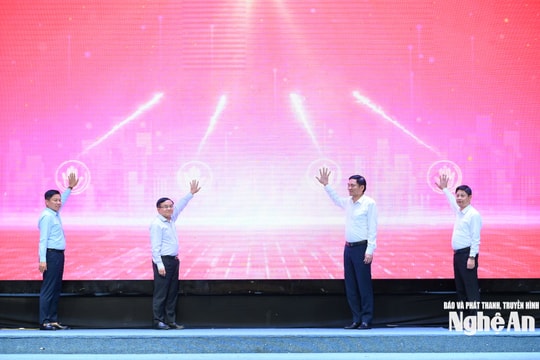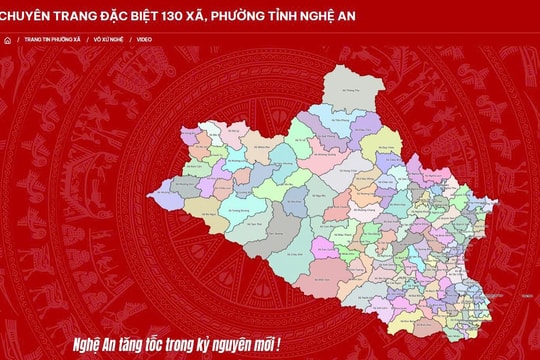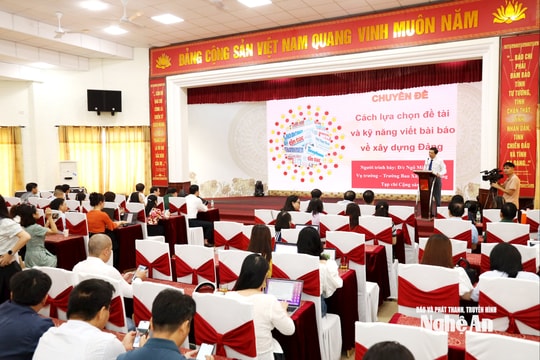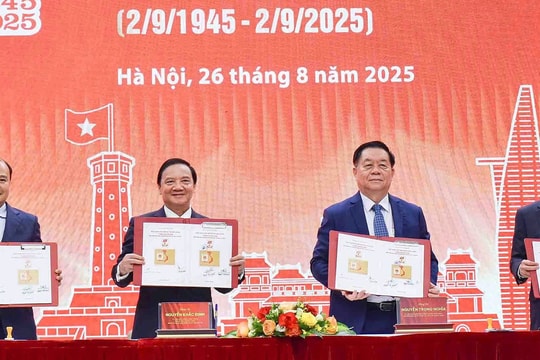A multidimensional view of press integration
If the Vietnamese press continues to do as it has been doing for a long time, I'm afraid the word "integration" will just be a formality.
In the integration “cycle”, the press is not only an active factor in propagating and encouraging all organizations and individuals in society to participate in integration and know how to integrate in the right direction and effectively, but the press itself must also strengthen and proactively integrate. So how has the Vietnamese press integrated so far? Vietnam Post would like to introduce some opinions on the integration activities of the Vietnamese press.
*Mr. Le Quoc Minh - Editor-in-Chief of VietnamPlus Electronic Newspaper
 |
| At the reporter-editor level, we have a long-standing difficulty: foreign languages. |
Generally speaking, Vietnamese press has integrated quite quickly and there is no shortage of any type compared to the world press, especially since the beginning of the 21st century. Vietnamese daily newspapers and weekly newspapers have progressed a bit slowly, but Vietnamese magazines have print quality and content that is not inferior to international magazines - this has been confirmed by many foreign experts. The same goes for Vietnamese television, which has developed rapidly in a short time. Not to mention the integration of dozens of foreign television channels. The first Vietnamese newspapers set foot on the Internet quite early, from 1997-1998, which is not too late compared to the world.
But to be fair, Vietnamese press has adopted world trends in a “half-hearted” way – meaning they catch up very quickly but stop there and do not continue to innovate. Many newspapers believe that having an electronic version on the Internet is enough, without building a long-term digital strategy. Currently, many newspapers in Vietnam are still struggling with building websites, while the world has long moved to mobile. Newspapers in Vietnam are hardly interested in building applications, and many newspapers have made mobile web versions quite rudimentary.
Many key issues of the world press in the past few years have not been given attention in the Vietnamese press, such as programmatic advertising technology, native advertising, modern and transparent access/user measurement and tracking tools. The Vietnamese press also seems to invest little in researching and developing new media products, still maintaining the traditional way of posting content, although combining text, photo, video information and calling it multimedia, but it is still too slow and simple compared to the world's way of doing things when they have combined location-based features, mobile communication or real-time technology (virtual reality) quite strongly. Even the design of Vietnamese websites is old-fashioned, while foreign newspapers have long applied "responsive" design - meaning a unified design that automatically changes according to the size of computer, tablet and mobile screens.
At the reporter-editor level, we have a long-standing difficulty in foreign languages. The majority of reporters and editors who lack this skill are at a disadvantage because they miss out on many opportunities to attend conferences, seminars, short- and long-term training courses... using English and French as their main languages. Also because they are not good at foreign languages, many people struggle to find documents, both in their specialized fields and in modern journalism documents. Also because of the lack of foreign languages, there are not many articles in Vietnam that look at the regional or international perspective, while the press in our neighboring countries such as Singapore, Thailand, Malaysia, and Indonesia has been doing so for a long time. The way journalism is done today has changed a lot, and I think each individual must improve and transform themselves, because schools - like the law - cannot change to keep up with the pace of development of reality. I think there are many young reporters and editors who are very active with these new changes, the problem is that they have not been given the opportunity to show themselves in their work.
The decisive factor of integration in the field of journalism probably depends largely on the editorial level. If editorial offices still maintain the old way of doing things, consider their newspaper as an oasis and only wander in that oasis, it cannot be called integration. Some newspapers are also struggling, looking for new directions, finding ways to reorganize in a converged editorial style, applying new technologies to monitor information, and streamlining work flow. But most editorial offices in Vietnam still work according to a formula that has not changed much compared to the way of doing journalism since the end of the last century. I know that, up to this moment, when the 21st century has passed nearly 1/5 of the way, some local printed newspapers still operate as... wall newspapers, stop production very early and do not care when there is new news. The world press now has to find all kinds of ways to be creative, make new products, accept experimentation and failure, but in the Vietnamese press it is very difficult to find such creativity. Or there are places where creativity is not adequately invested, so the products only reach a certain level and then stop developing or even decline. If the Vietnamese press continues to do as it has for a long time, I am afraid that the word “integration” will only be a formality.
*Ms. Luong Bich Ngoc - Editor-in-Chief of Discovery Electronic Magazine
 |
| This integration achievement has had no small contribution from the press and media. |
Integration in a new perspective, when almost everything is increasingly open, information exchange, import and transmission also become easier at a dizzying speed. Advances in science and technology, the political and economic situation of countries and organizations in the world have now become daily discussions of many Vietnamese people. And a Vietnam with a stable political environment and beautiful landscape is not unfamiliar to any international friends. Bilateral and multilateral economic cooperation between Vietnam and the rest of the world increasingly contributes significantly to development.
This integration has had a significant contribution from the press and media. Journalists now play the role of “importers” and “exporters”, here no longer of tangible goods but of importing and exporting information.
To be able to “import” quality information and “export” information of interest to the world, journalists in the integration era, in addition to being sharp and sensitive, need to be fluent in foreign languages and technology. Multi-dimensional interaction on that platform helps journalists thoroughly understand the issues that need to be talked about and written about at an extremely fast speed. Only then can they exploit information quickly and accurately to attract readers to their side. Just like the story, if you want to cross the river quickly and safely, you have to find a boat to get on. Journalism in the integration era is the same.
*Mr. Nguyen Truong Son - Director of the Center for International Press and Media Cooperation, Ministry of Information and Communications
 |
| Journalism and media is one of the pioneering industries in the field of international integration. It not only has to proactively integrate but also help other industries and fields to integrate. |
Journalism and communication is one of the pioneering sectors in the field of international integration, not only must it proactively integrate but also help other sectors and fields to integrate. In recent times, the journalism and communication sector has made great efforts to keep up with the pace of development of the world, the application of high technology is increasingly put on top. Vietnam has the advantage of being among the countries with the fastest development of IT-TT, the number of Internet users, the number of television channels and newspapers are also among the top in the world and the region. This is a favorable condition for Vietnamese journalists, television and communication workers to promote their capacity and talent.
In recent times, our Center has regularly had activities related to exchange and introduce press and media products to foreign countries. We have organized the ASEAN photo and documentary film festival three times, receiving many photos and documentary films from ASEAN countries. In general, we can see that Vietnamese photo and documentary works, if compared to the regional level, are not inferior to any other. We are even better than some countries.
The advantage of Vietnamese press and media today is that they learn their trade very quickly and are very active when integrating. But one of the disadvantages of Vietnam today is that they often confuse propaganda journalism and entertainment journalism. If we make a general magazine newspaper, it certainly cannot have depth.
On the other hand, there are many Vietnamese newspapers that are making newspapers in the opposite way to the modern journalism process in the world. In theory, modern journalism requires the design department to design fixed pages from the beginning based on scientific research, for example, each page must clearly specify the number of words, articles, and photos, so that when readers open the newspaper to read, they will not tire their eyes and will get a lot of information. Meanwhile, many of our press agencies base their page design on the content of the news articles, which often makes readers tired and bored and stop reading. Or in the field of television, according to the modern journalism process, there must be a script and commentary, then go to filming to serve the film's orientation, but in Vietnam today, there are still some places that after the script is oriented, go to filming and then write commentary, if this scene is missing, they do not write commentary anymore, only comment on what they have, leading to the final product being different from the original plan. Like a house that looks very beautiful, every detail looks very beautiful but the whole picture is distorted and messy because it is not uniform.
*Blogger Nguyen Ngoc Long - Head of Black Moon Media Group
 |
| Vietnamese press is catching up very quickly with the world press. For example, working with smartphones, publishing on app stores, live broadcasting on Youtube and interactive journalism. |
Frankly speaking, when integrating, Vietnamese press still has many limitations but also has its own advantages. First is the brand. Many large media agencies in the world have global brands and global operations, so when "entering Vietnam", they will make readers feel more "impressive". However, I think this feeling will not last long, because the characteristic of the press is still the diversity of essential information. And in this respect, clearly Vietnamese press has an advantage.
Looking at copyrighted entertainment newspapers such as Cosmopolitan, Bazaar, Esquire, or foreign entertainment channels like MTV, I see that they cannot compete with domestic newspapers. Obviously, home-field advantage, information acumen, diverse number of contributors, and understanding of local culture are still core competitive advantages.
Technical factors are not a big barrier. Although we have only talked a lot about multimedia communication, not multimedia journalism. But in fact, modern means and methods of working are also being caught up very quickly by the Vietnamese press with the world press. For example, working with smartphones, publishing on application markets, live broadcasting on Youtube and interactive journalism.
But whatever is said, the key point of the press must still be the diversity and sensitivity of information. I think the Law on Access to Information is an issue that the press needs to pay special attention to. To integrate well, the press needs to compete on a fair playing field. This draft law, when passed, will create a huge boost for the domestic press, and fill in the missing pieces to be ready for the integration game.
As for contributing to the development of Vietnam, I think the press needs to approach universal global issues and globally shared values, such as human rights, transparency and integrity.
Up to now, the domestic press has done a very good job of monitoring and criticizing, thereby helping to improve the country's governance and management by public agencies. But in a bigger game, we must pay attention to bigger issues.
The concepts may seem unfamiliar, the press must contribute to conveying them in a popular way to the public so that each person can truly be a global citizen. Only with global citizens can we have a global industry and economy, creating confidence and a solid mindset for Vietnam in the process of integration and development.
Integration in a new perspective, when most things are increasingly open, information exchange, import and transmission also become easier at a dizzying speed.
According to Infonet.vn
| RELATED NEWS |
|---|



.jpg)




